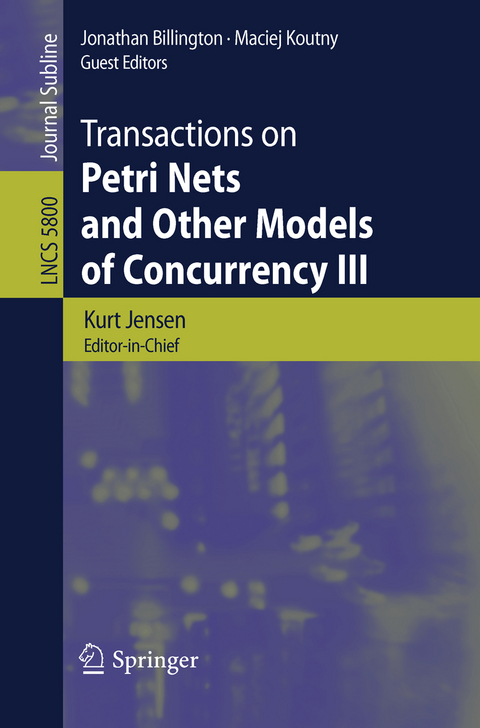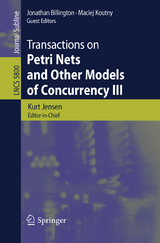Transactions on Petri Nets and Other Models of Concurrency III
Seiten
This volume contains papers from the 29th International Conference on Application and Theory of Petri Nets and Other Models of Concurrency and from the 8th and 9th Workshops and Tutorials on Practical Use of Coloured Petri Nets and the CPN Tools.
AccordingtoHolzmann [14], protocol speci?cationscomprise ?veelements: the service the protocol provides toits users; the set of messages that are exchanged between protocol entities; the format of each message; the rules governingm- sage exchange (procedures); and the assumptionsabout the environment in which the protocol is intended tooperate. In protocol standards documents, information related to the operatingenvironment isusually writteninformally andmayoccur in several di?erentplaces [37]. This informal speci?cation style canlead to misunderstandings andpossibly incompatible implementations. In contrast,executableformalmodelsrequireprecisespeci?cations oftheoperating environment. Ofparticularsigni?canceisthecommunicationmediumorchannel over which the protocol operates. Channelscan havedi?erent characteristics depending on the physical media (e. g. optical ?bre, copper, cable orunguided media (radio)) they employ. The characteristics also depend on the levelof the protocol inacomputer protocol architecture. Forexample, the link-leveloperates over a singlemedium,whereas the network, transport andapplication levelsmayoperate over a network,or network of networks such as the Internet,which couldemploy several di?erent physical media. Channels (such as satellite links) can be noisy resulting in bit errors in packets. To correct biterrors in packets, many importantprotocols (such the Internet s TransmissionControl Protocol [27]) use CyclicRedundancy Checks (CRCs)[28] to detect errors. On detectingan error,the receiver discards the packet andrelies on the sender to retransmit itforrecovery,known as Au- maticRepeatreQuest(ARQ)[28]. Thisisachievedbythereceiveracknowledging the receipt of good packets, andby the transmitter maintainingatimer. When the timer expires before an acknowledgementhasbeen received, the transmitter retransmits packets that havebeen sent but are as yet notacknowledged. It may also be possibleforpacketsto be lost due to routers in networks discarding packets when congested.
AccordingtoHolzmann [14], protocol speci?cationscomprise ?veelements: the service the protocol provides toits users; the set of messages that are exchanged between protocol entities; the format of each message; the rules governingm- sage exchange (procedures); and the assumptionsabout the environment in which the protocol is intended tooperate. In protocol standards documents, information related to the operatingenvironment isusually writteninformally andmayoccur in several di?erentplaces [37]. This informal speci?cation style canlead to misunderstandings andpossibly incompatible implementations. In contrast,executableformalmodelsrequireprecisespeci?cations oftheoperating environment. Ofparticularsigni?canceisthecommunicationmediumorchannel over which the protocol operates. Channelscan havedi?erent characteristics depending on the physical media (e. g. optical ?bre, copper, cable orunguided media (radio)) they employ. The characteristics also depend on the levelof the protocol inacomputer protocol architecture. Forexample, the link-leveloperates over a singlemedium,whereas the network, transport andapplication levelsmayoperate over a network,or network of networks such as the Internet,which couldemploy several di?erent physical media. Channels (such as satellite links) can be noisy resulting in bit errors in packets. To correct biterrors in packets, many importantprotocols (such the Internet s TransmissionControl Protocol [27]) use CyclicRedundancy Checks (CRCs)[28] to detect errors. On detectingan error,the receiver discards the packet andrelies on the sender to retransmit itforrecovery,known as Au- maticRepeatreQuest(ARQ)[28]. Thisisachievedbythereceiveracknowledging the receipt of good packets, andby the transmitter maintainingatimer. When the timer expires before an acknowledgementhasbeen received, the transmitter retransmits packets that havebeen sent but are as yet notacknowledged. It may also be possibleforpacketsto be lost due to routers in networks discarding packets when congested.
Designing a Workflow System Using Coloured Petri Nets.- From Requirements via Colored Workflow Nets to an Implementation in Several Workflow Systems.- Soundness of Workflow Nets with Reset Arcs.- Parameterised Coloured Petri Net Channel Models.- On Modelling and Analysing the Dynamic MANET On-Demand (DYMO) Routing Protocol.- Modelling Mobile IP with Mobile Petri Nets.- A Discretization Method from Coloured to Symmetric Nets: Application to an Industrial Example.- The ComBack Method Revisited: Caching Strategies and Extension with Delayed Duplicate Detection.- Comparison of Different Algorithms to Synthesize a Petri Net from a Partial Language.- On Bisimulation Theory in Linear Higher-Order ?-Calculus.
| Erscheint lt. Verlag | 11.11.2009 |
|---|---|
| Reihe/Serie | Lecture Notes in Computer Science | Transactions on Petri Nets and Other Models of Concurrency |
| Mitarbeit |
Chef-Herausgeber: Kurt Jensen Gast Herausgeber: Jonathan Billington, Maciej Koutny |
| Zusatzinfo | XVII, 275 p. |
| Verlagsort | Berlin |
| Sprache | englisch |
| Maße | 155 x 235 mm |
| Gewicht | 450 g |
| Themenwelt | Mathematik / Informatik ► Informatik ► Software Entwicklung |
| Mathematik / Informatik ► Informatik ► Theorie / Studium | |
| Mathematik / Informatik ► Mathematik ► Allgemeines / Lexika | |
| Mathematik / Informatik ► Mathematik ► Logik / Mengenlehre | |
| Schlagworte | Calculus • Coloured Petri Nets • Design • formal language • Formal models • Hardcover, Softcover / Informatik, EDV/Informatik • Manet • mobile petri nets • Model-Checking • Modeling • Petri Nets • Pi-calculus • Simulation • Software engineering • workflow nets |
| ISBN-13 | 9783642048548 / 9783642048548 |
| Zustand | Neuware |
| Informationen gemäß Produktsicherheitsverordnung (GPSR) | |
| Haben Sie eine Frage zum Produkt? |
Mehr entdecken
aus dem Bereich
aus dem Bereich
Entwurfsmuster für effektive Softwareentwicklung
Buch | Softcover (2024)
Springer Vieweg (Verlag)
CHF 27,95
Praxishandbuch für Java- und Webservice-Entwickler
Buch | Softcover (2025)
dpunkt (Verlag)
CHF 62,85




